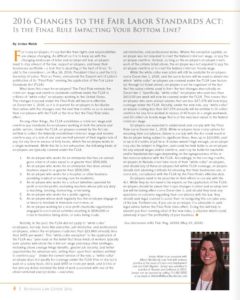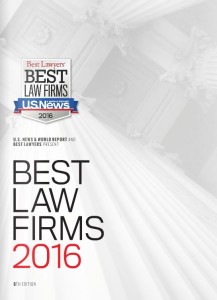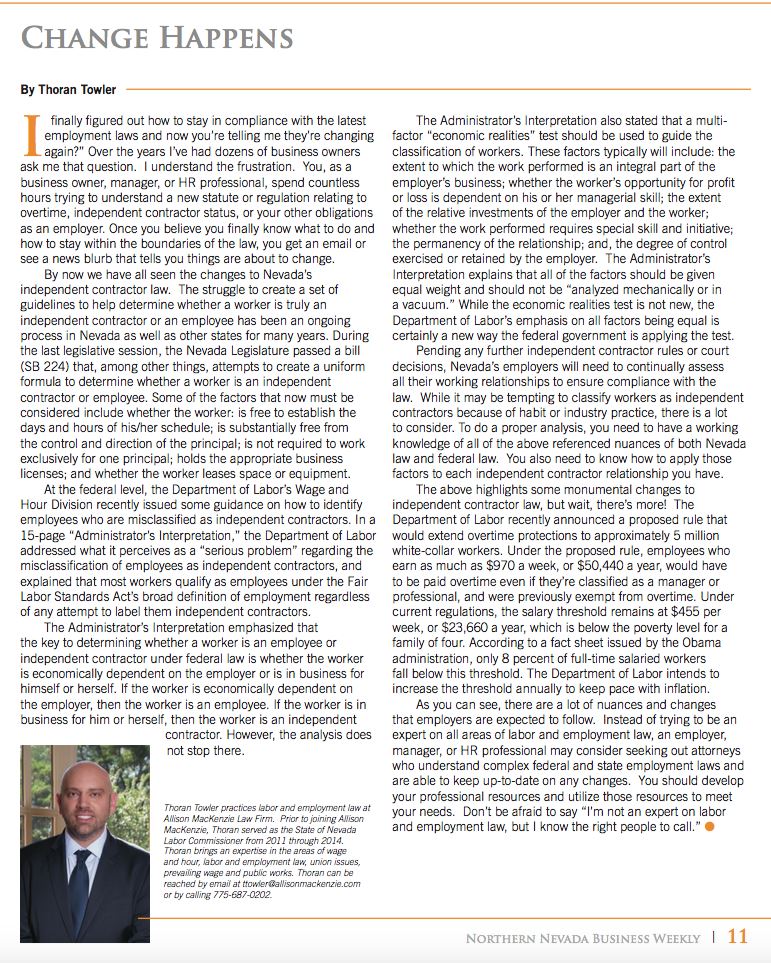
Implementing an Employer-Sponsored Optional Volunteer Program?

Make Sure it Complies with the Fair Labor Standards Act
Many employers understand the value of giving back to their communities and realize the benefit of visibility within their communities. Thus, an increasing number of employers are following the new trend of implementing optional community service programs within their companies. In an employer-sponsored volunteer program, the employer allows employees to volunteer for a certain number of working hours each year or each month while providing the workers with the compensation they would have received for being on the job. In some instances, employees may volunteer during non-working hours and still receive some type of monetary award. These can include bonuses or non-monetary awards such as a party or other fun outing or activity.
In an employer-sponsored volunteer program of this nature, the employer may either sponsor a volunteer outing or outings in which employees can participate. Alternatively, businesses may allow employees to participate in a volunteer activity they have chosen for themselves. Such a program can have a significant benefits for both employees and employers, including improved morale at the work place, increased involvement and contributions in the community, and visibility within the community. However, it is wise to be cautious in the implementation of a volunteer program within any business or workplace.
A March 14, 2019 Opinion issued by the Wage and Hour Division of the United States Department of Labor addresses such programs and how they have the potential to violate the Fair Labor Standards Act (FLSA). The Opinion provides that “Congress did not intend for the FLSA ‘to discourage or impede volunteer activities,’ but rather to ‘prevent manipulation or abuse of minimum wage or overtime requirements through coercion or undue pressure upon individuals to ‘volunteer’ their services.’”
As such, under the law, an employer intending to implement a volunteer program is permitted to notify its employees of such volunteer opportunities and activities as well as ask for assistance from employees in participating in such volunteering tasks. An employer is also permitted to implement an incentive-based program so long as an employee’s participation in such a program is not mandatory. An employer-sponsored volunteer program cannot adversely affect working conditions or employment prospects for employees whether they do or do not choose to participate. In other words, an employer cannot engage in direct or implied retaliatory actions against an employee who chooses not to participate. Further, the employer cannot put undue pressure on the employees to participate in the program.
Moreover, the Opinion stated that an employer cannot “control or direct” the volunteer work of its employees. Specifically, an employer is not permitted to allow or disallow certain types of volunteer work and/or direct the employee on how to accomplish such volunteer work. If the employer does “direct or control” the way in which an employee completes a volunteering task and/or volunteering activity, that time will be considered hours worked under the FLSA. In turn, those hours are subject to the regulation of overtime and other standards under the FLSA. The Opinion also stated that employers may use certain methods of tracking the volunteer hours of its employees so long as the tracking device does not control or instruct the employee in their volunteerism.
The Opinion also states that compensating employees when they participate in volunteer activities during normal working hours does not “jeopardize their status as volunteers when they participate in volunteer activities outside of normal work hours.”
An employer may use an employee’s time volunteering as a factor in calculating whether to provide that employee with a bonus, “without incurring an obligation to treat that time as hours worked so long as: (1) volunteering is optional; (2) not volunteering will have no adverse effect on the employee’s working conditions or employment prospects; and (3) the employee is not guaranteed a bonus for volunteering.” In essence, a bonus cannot be guaranteed to an employee who volunteers and/or taken away from an employee who does not volunteer.
Therefore, if an employer chooses to engage its employees by implementing a volunteer program, the employer must ensure that it is complying with the FLSA. In order to do so, employers must ensure the following items are adhered to 1) employee volunteering is completely optional; 2) there are no adverse impacts or effects on employees who choose not to volunteer; 3) if an employer chooses to provide bonuses to employee-volunteers, that the bonus is not guaranteed in exchange for the employee’s volunteer hours; and 4) the employer does not direct or control the employee volunteer activities.
Employer-sponsored volunteer programs are valuable tools that provide many benefits for companies, employees and communities alike. If you, as an employer, are considering implementing such programming, it is important to confer with legal counsel regarding the specifics of such a program to ensure compliance with the FLSA.
Are Your Workers Considered Independent Contractors or Employees under Nevada Law for the Purposes of Payment and Collection of Wages and Other Benefits?
If you are an employer in Nevada, you know your employees are required to be paid a minimum wage for work performed, be provided certain insurance benefits depending on full or part-time status, be compensated properly for overtime, are allowed breaks, and other benefits. You may also know that if you engage independent contractors, these workers are not necessarily entitled to all the benefits afforded to those with an employee status. It is important for you, as an employer, to know the distinction between an independent contractor and an employee to protect your business from liability.
To establish an independent contractor relationship for the purposes of payment and collection of pay and other benefits, there is a relatively new law that has been enacted in Nevada to help employers and workers alike determine their role in the workplace. The determination that a worker is an independent contractor is dependent on several factors that have been enumerated within the law.
In June of 2015, Senate Bill 224 was signed into law. The bill created a “conclusive presumption” that a person is considered an independent contractor if that person meets certain criteria set forth under the law. A “conclusive presumption” requires a court to presume an issue or fact is true notwithstanding evidence to the contrary. Therefore, if a court makes a conclusive finding that a worker is an independent contractor, the worker will not be able to provide evidence to the court opposing that finding.
Under S.B. 224, codified at NRS 608, a person is conclusively presumed to be an independent contractor for the purposes of Nevada Revised Statutes (NRS) Chapter 608—Provisions Governing Payment and Collection of Wages and Other Benefits– if the following requirements are met:
a. The person must not be a foreign national and must be legally present in the United States;
b. The person is required, under their contract with the principal, to hold necessary state or local business licenses and maintain any necessary occupational licenses, insurance or bonding; and
c. The person meets three or more of the following requirements:
1. The person has control over the means and manner of the performance of the work they do and the result of that work;
2. The person has control over the time in which the work is performed (an exception is made here with respect to agreements with a principal regarding completion schedule, range of work hours, and/or for those performing as entertainers);
3. The person is not exclusively required to work for the principal unless the law or a regulation requires exclusivity, and/or the agreement provides for exclusive services for a limited period;
4. The person can hire employees to assist with the work;
5. The person contributes a substantial investment of capital in the business of the person, for instance the purchase of tools and equipment, and/or the person asks for permission from the principal to access the work space from the principal and/or leases the work space from the principal.
For the purposes of this article, the principal is the person who engages another to do any work.
If a person does not meet three or more of the requirements of section (c), that does not mean they will be considered an employee, rather there will be no conclusive presumption made regarding the person’s status as an independent contractor. A finder of fact, meaning a judge or jury depending on the proceeding, will have to determine whether the worker is an independent contractor or an employee under the law.
In interpreting the factors presented in NRS 608, the important word to keep in mind is control. Does the worker or the principal (employer) have control over the timing and the manner in which the work is performed? Does the worker or the principal have control over the materials, tools, and space in which the person is working? Who has control over the financial aspects of the tasks to be performed? Does the worker have the freedom to perform work for a different entity while also working for the principal? If the general answer is that the worker has the control over those aspects, it is likely that the person will be deemed an independent contractor under the law.
Please note that the conclusive presumption of an independent contractor under NRS 608 only applies to Nevada’s wage and hour and benefits laws. The tests for determining whether someone in an independent contractor for the purposes of unemployment, the Nevada Industrial Insurance Act (NIIA), and for tax purposes can be found in other places within the Nevada Revised Statutes and the Federal Tax Laws.
As always, it is of the utmost importance for business owners to have a signed, written agreement with independent contractors that outlines their duties, responsibilities, and the expectations of the task or job to be performed. Be aware, however, that merely classifying a worker as an “independent contractor” in an agreement or contract will not be conclusive as to whether that worker is indeed an independent contractor or employee under the law.
See the Article at NNBV
Are you in compliance with the Pregnant Workers’ Fairness Act?
If you are an employer in Nevada, you probably are well aware that federal law prohibits you from discriminating against employees and/or potential employees on the basis of pregnancy or a pregnancy-related condition. Additionally, you probably already understand that you are required to provide reasonable accommodation to such employees. However, many employers are unfamiliar with the Nevada Pregnant Workers’ Fairness Act of 2017, adopted during the 2017 legislative session, and its impact on interactions between employers and such employees. In this article, we will review the underlying federal law establishing the baseline for interactions with employees who are pregnant, or suffering from pregnancy related conditions, and discuss how the Act, which went into effect on Oct. 1, 2017, differs from prior law.
In 1978, Congress enacted the Pregnancy Discrimination Act of 1978 (PDA) which expanded protections to pregnant workers provided under Title VII of the Civil Rights Act of 1964. The PDA makes it unlawful for an employer to discriminate against an employee on the basis of pregnancy, childbirth or a related condition.
Subsequently, in 1990 Congress enacted the Americans with Disabilities Act (ADA), which requires employers to provide reasonable accommodations to employees suffering from a disability. Congress further expanded protections under the ADA in 2008 by requiring employers to accommodate temporary disabilities. While pregnancy is not classified as a “disability,” if a pregnancy, or related condition, impairs a woman’s ability to complete her essential job functions, under the 2008 amendment an employer is required to provide reasonable accommodation to assist the employee in completing her essential job functions. Under the ADA, an employer, and not the employee, is given the authority to select the accommodation. Accordingly, where an employer offers a reasonable accommodation to an employee, the employee must prove that the accommodation is unreasonable to successfully challenge the employer’s accommodation.
The 2017 Nevada Pregnant Workers’ Fairness Act significantly expands protections for pregnant workers, and workers suffering from pregnancy related conditions in Nevada. Specifically, the Act makes it unlawful for an employer who is covered under the Act to engage in any of the following actions against a female employee who is pregnant, or suffers from a pregnancy related condition:
- Refuse to provide a reasonable accommodation to the employee.
- Take an adverse employment action against the employee.
- Deny the employment opportunity to the employee, if she is qualified for the opportunity.
- Require the employee to accept an accommodation that she did not request or choose.
- Require the employee take leave from employment, if a reasonable accommodation is available and would allow the employee to remain at work.
Additionally, employers should be aware that their current compliance with federal law, will not ensure compliance with the Nevada Pregnant Workers’ Fairness Act. Specifically, there are four important distinctions between what is required under federal law and what is required under the Act. These differences are:
- Federal Law is not gender specific. However, the Act only applies to female employees.
- Under federal law, the employer determines what accommodation is reasonable and may require the employee to use an accommodation selected by the employer. Further, an employer could require an employee to take leave as an accommodation. Under the Act, an accommodation may not be imposed on an employee without her consent, and an employer may not require an employee to take leave. Therefore, under the Act, generally, the employee, and not the employer, chooses her accommodation.
- Under federal law, an employee may be required to submit a doctor’s certificate establishing that she indeed has a recognized disability and needs accommodation. However, under the Act, the employer may not require an employee to submit an ADA compliant doctor’s certificate. Instead, an employer may only require the employee to provide an explanatory statement from a physician concerning a recommended accommodation.
- Finally, under federal law, a “disability” is a defined term, and is limited to physical or mental impairments that substantially limit a major life activity. Accordingly, in order to qualify for accommodation under federal law, an employee must be able to prove that he or she suffers from a condition which “substantially limit[s]” one or more major life activity. Under the Act, there is no such limitation to finding an employee suffers from a condition triggering the right to accommodation. Instead, the Act only requires the employee to assert that she is pregnant, or has “any medically recognized physical or mental condition related to pregnancy, childbirth or recovery from pregnancy or childbirth” in order to obtain accommodation from her employer.
Employers should be cognizant of these changes, and the differences between federal and state law. Further, employers should consider seeking competent legal advice should they have any questions concerning compliance with the Act.
See the article at: Northern Nevada Business Weekly
Jordan Walsh is an associate with Allison MacKenzie Law Firm with primary practice in the areas of Labor and Employment Law. Jordan is admitted to practice in Nevada and California.
Allison MacKenzie Attorney, Jordan Walsh, Explains the Department of Labor’s Final Rule
The way we plan for retirement in the United States has changed drastically in recent years. In the past, employees could rely on their pension, which was typically managed by a financial expert, to support them through retirement. Today, for most of us, pensions are things of the past, and we, as individuals, are responsible for making the financial choices that will shape when and how we may retire.
While this system provides retirement savers with the flexibility to make financial choices that are uniquely tailored for their situations, this method of saving is fraught with pitfalls for retirement savers because most of us lack the expertise, time, and confidence, to invest our savings in a manner that will allow us to efficiently meet our retirement goals. Accordingly, we look to financial advisors to assist us in making smart financial decisions that will allow us to reach our retirement saving goals.
While most of us have good relationships with our financial advisors, statistics suggest there’s a segment of financial advisors who abuse the trust of their clients by putting their own financial gain above that of their clients. The Department of Labor (DOL) and the White House Council of Economic Advisors (CEA) estimate on average conflicts of interest between unscrupulous financial advisors and their clients cause retirement savers to earn one full percentage point less annually than would be expected based on the status of the economy on their returns.
Furthermore, the DOL estimates such advisors cause their clients to waste upwards of $17 billion of retirement savings every year on exorbitant fees and lost revenue associated with the purchase of ill-advised financial products resulting from a conflict of interest. These conflicts of interest can occur because financial advisors aren’t currently held to a fiduciary standard under the law, and for this reason, they owe their clients no duty to provide advice that aligns with the client’s financial goals. In fact, it’s common for firms and purveyors of financial products to provide financial incentives to advisors whose clients invest in certain financial products.
For the complete article, visit: Nevada Appeal.
Jordan Walsh is an associate with Allison MacKenzie Law Firm with primary practice in the areas of Labor and Employment Law and Civil Litigation. Jordan was admitted to practice in Nevada and California in 2014.
Allison MacKenzie Attorney, Will Wagner, Explores Non-Compete Provisions
In a July 2016 opinion, Golden Road Motor Inn, Inc. v. Islam (“Golden Road”), the Nevada Supreme Court pronounced a new legal rule regarding the enforceability of overbroad non-compete provisions in Nevada. In light of Golden Road, it would be prudent for any entity conducting business in the State that relies on non-compete provisions to reevaluate the scope of such agreements to ensure they remain enforceable.
A non-compete provision is a contractual clause that prevents an employee from joining a competitor following the termination of employment. Non-compete provisions are important to businesses that use sensitive information such as proprietary client lists or similar trade secrets. These provisions also protect a business’s investment in training and retaining quality employees, while deterring competitors from luring valuable workers.
Non-Compete Provisions can be Overbroad in Timeframe or Geographical Scope Restrictions
Typically, the state’s laws in which the employee works will govern a non-compete provision. Non-compete laws vary widely from state to state as to enforceability and overbreadth. For instance, in California, under most circumstances a non-compete provision is unenforceable and cannot restrict an employee from joining a competitor. The primary exception to this being that when a business is sold, the selling entity and its employees can be restricted from competing. Many other states, including Nevada, allow non-compete provisions generally (both in the normal course of business and while a business is being sold) so long as the scope is reasonable and germane to the organization’s interests.
For the complete article, visit: Northern Nevada Business Weekly.
Will Wagner joined Allison MacKenzie Law Firm in 2016. He is a native Nevadan and University of Nevada, Reno graduate. Will pursued and obtained his law degree from the Sandra Day O’Connor College of Law at Arizona State University where he graduated cum laude. Upon graduating from law school, he served as a law clerk to Justice James W. Hardesty on the Supreme Court of Nevada. He was admitted to practice law in Nevada in 2015, and California in 2016. Will’s areas of legal practice include Business, Real Estate, Employment, Appellate, and Administrative Law.
Will Wagner Joins Allison MacKenzie Law Firm
Fernley native Will Wagner accepted an associate position with Allison MacKenzie Law Firm in Carson City, effective Sept. 12 of this year. Wagner will focus his practice in business, real estate, employment, appellate practice, commercial litigation, governmental affairs and administrative law.
Upon graduating from Fernley High School, Wagner attended the University of Nevada, Reno where he began his studies in biochemistry before ultimately deciding to become an attorney and pursuing a degree in political science with a minor in business administration. In 2015, he obtained his Juris Doctor Degree from Sandra Day O’Connor College of Law at Arizona State University where he graduated cum laude. He returned to the area and began his legal career as a law clerk for Justice James W. Hardesty at the Supreme Court of Nevada.
See the complete article: Nevada Appeal
2016 Changes to the Fair Labor Standards Act: Is the Final Rule Impacting Your Bottom Line?
Jordan Walsh is an associate with Allison MacKenzie Law Firm and was asked to explore the Fair Labor Standards Act for Northern Nevada Business Weekly. Her analysis can be found in the 2016 Business Law Publication or read below.
For many employers, it may feel like their rights and responsibilities are always changing. As difficult as it is to keep up with the changing landscape of labor and employment law, employers need to stay abreast of the law, support employees, and keep their businesses profitable – a task that is daunting at the best of times. To add to the conundrum, on May 18, 2016, President Obama and the U.S. Secretary of Labor, Thomas Perez, announced the Department of Labor’s publication of its “Final Rule” revising the application of the Fair Labor Standards Act (FLSA).
What does this mean for employers? The Final Rule extends the minimum wage and overtime standards outlined under the FLSA to millions of “white collar” employees working in the United States. The changes imposed under the Final Rule will become effective on December 1, 2016, so it is important for employers to familiarize themselves with the changes over the next few months so as to ensure their compliance with the FLSA at the time that the Final Rule takes effect.
Among other things, the FLSA establishes a minimum wage and overtime pay standards for employees working in both the private and public sectors. Under the FLSA, employees covered by the Act are entitled to collect the federally established minimum wage and receive overtime pay, at a rate of one and one-half percent of their regular rate of pay, for any time in excess of forty hours, which the employee works in a single workweek. While this list is not exhaustive, the following kinds of employees are typically covered under the FLSA:
1. An employee who works for an enterprise that has an annual gross volume of sales equal to or greater than $500,000.00;
2. An employee who works for an enterprise that does annual business equal to or greater than $500,000.00;
3. An employee who works for a hospital, or other business providing medical or nursing care for residents;
4. An employee who works for a school (whether operated for profit or not-for-profit), excluding teachers whose primary duty is teaching, tutoring, instructing, or lecturing.
5. An employee who works for a public agency;
6. An employee whose work regularly has the employee engage in or become involved in interstate commerce; or
7. An employee working for a non-profit charitable organization engaged in commercial activities resulting in $500,000.00 or more in business being done, or sales being made.Notably, in the past, the FLSA did not apply to “white collar” employees; namely, bona fide executive, administrative, and professional employees, unless the employees made less than $23,660.00 annually (less $455.00 per week). This “white collar exception” to the application of the FLSA was “premised on the belief that these kinds of workers typically earn salaries well above the minimum wage and enjoy other privileges, including above average fringe benefits, greater job security, and better opportunities for advancement, setting them apart from workers entitled to overtime pay.” Under the current version of the rule, a “white collar” employee does not qualify for coverage under the FLSA if he or she (a) is paid on a salary basis, (b) is paid $455.00 or more per week, and (c) his or her primary duties involved the kind of work associated with one of the aforementioned exempt duties – executive, administrative, and professional duties. Where this exception applied, an employer was not required to meet the federal minimum wage, or pay the employee overtime. Instead, so long as the employer’s employee meets each of the criteria listed above; the employer was not required to pay the employee overtime or to meet the federal minimum hourly wage.
While the white collar exemption will still be available for employers come December 1, 2016, and the same factors will be used to determine which “white collar” employees are covered under the FLSA (see factors (a) through (c) listed above), employers must be cognizant of the fact that the salary criteria used to from the test changes dramatically on December 1st. Specifically, “white collar” employees who earn less than $913.00 per week will now be covered under the FLSA. This means that employees who earn annual salaries that are less $47,476.00 will now enjoy coverage under the FLSA. Notably, under the new rule, any “white collar” employee making less than $47,476.00 annually will be entitled to (i) collect overtime for any time worked in excess of 40 hours in a single workweek, and (ii) collect an hourly wage that is at the very least equal to the federal minimum wage.
Employers are expected to understand and comply with the Final Rule come December 1, 2016. While employers have many options for ensuring their compliance, failure to comply with the Act could result in the employer being subject to significant fines, fines up to $10,000.00; and/or up to 6 months of jail time. If stakes weren’t high enough, an employer may also be subject to litigation, and could be held liable to an employee for any unpaid wages and/or overtime, and may be liable for equitable and/or liquidated damages depending on the egregiousness of his or her non-compliance with the FLSA. Accordingly, in the coming months, employers in Nevada must take stock of their “white collar” employees, and should any of these employees fall within FLSA coverage, employers should start planning methods for ensuring that their businesses are, or come into, compliance with the FLSA by the Final Rule’s effective date.
Employers need to be proactive in their efforts to comply with the Act. While they do not need to be experts on the application of the FLSA; employers should be aware that major changes to labor and employment law will be taking effect come December 1st, and should they have any questions or concerns regarding their compliance with the law, they should seek legal counsel to assist them in navigating this complex area of the law. Furthermore, if you are an employer, it is advisable to seek legal advice before the Final Rule takes effect. Doing this will help to prevent you from running afoul of the new rules, a situation which could adversely impact the profitability of your business.
About Jordan Walsh
Jordan Walsh is an associate with Allison MacKenzie Law Firm with primary practice in the areas of Labor and Employment Law and Civil Litigation. Jordan was admitted to practice in Nevada and California in 2014. Jordan can be reached by calling 775.687.0202 or by email at [email protected].
Allison MacKenzie Law Firm of Carson City, Nevada has been recognized as one of the 2016 “Best Law Firms” by US News and World Reports.
Allison MacKenzie Law Firm was honored with a Metropolitan Tier 1 ranking in the practice area of Energy Law.
To see the complete 6th Edition of the Best Law Firms 2016 publication click here or on the image below.
Article-Change Happens by Thoran Towler
Allison MacKenzie associate, Thoran Towler was recently asked to do an article for Northern Nevada Weekly’s special publication Business Law 2015. Thoran used the opportunity to expand on his article series on Employment Law issues that effect businesses in the state of Nevada.
Thoran Towler practices labor and employment law at Allison MacKenzie Law Firm in Carson City and serves clients in Northern Nevada areas such as: Reno, Sparks, Fernley, Gardnerville, Minden, Lake Tahoe, Dayton and Carson City. Prior to joining the firm, he served as the State of Nevada Labor Commissioner from 2011 through 2014. Thoran is experienced in the areas of wage and hour, labor and employment law, union issues, prevailing wage and public works.
To read the full article in the publication click here or the image below.
Carson City, Nevada Attorney Thoran Towler
Thoran Towler continues his educational series on Employer Rights and Responsibilities with High Expectations for Employers. Featured in Carson Now, Thoran Towler explores Nevada law and its effect on Employment Law for local businesses.
Nevada is one of 23 states with laws protecting the medical use of marijuana. Although the laws vary widely in each of the 23 states, the standard rule is that individuals with qualifying medical conditions may legally use marijuana. The big question for employers is whether an employee can be terminated for medical marijuana use. Many employers have drug-free workplace policies that prohibit the use of illegal drugs both on and off the clock. Regardless of Nevada’s position on medical marijuana, marijuana use is still illegal according to federal law. Nevada employers may be at a loss on how to handle violations of their drug-free workplace policies by employees who carry “medicinal marijuana cards.”
Read the complete article at CarsonNow.org.












